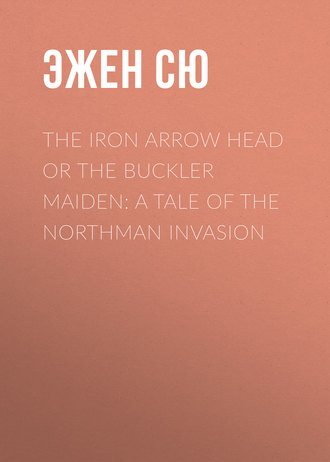
The Iron Arrow Head or The Buckler Maiden: A Tale of the Northman Invasion
"Almighty God, have mercy upon us! Deliver us from these pagans! From these demons! Alack! Alack! What ills are about to afflict the servitors of your Church! What ravages! Our goods will be pillaged by these sacrilegious wretches! Oh, Lord! Deliver us from the Northmans! Command your angels to exterminate these pagans!"
In the midst of these exclamations Fultrade entered, at last. He looked cross and irritated. His face was inflamed.
"Come in, Fultrade," the count called to him when he saw the monk appear at the threshold of the abbot's apartment. "Come in; you are the only man of thought and action in this place;" and turning to the abbot, whose whimpering annoyed him, the count added: "Fortunat, quit your lamentations! The hour calls for action, not for whines!"
The monks repressed their moans with difficulty, while the Count of Paris, addressing Fultrade in particular, said:
"The moments are precious – the Northmans have appeared at the mouth of the Seine. They are said to be under the command of one of their most intrepid sea-kings, named Rolf. Their fleet is so numerous that it covers the whole width of the mouth of the river. They can not now be further away than ten or twelve leagues from here. The means to repel them must be considered."
"And how comes it that we have not been apprised of the arrival of these accursed men?" inquired Fultrade in a rage. "They have passed Rouen. How comes it that the people of that city did not spread the alarm? There is treason in this!"
"Oh! What do the people of Rouen care about the arrival of the pirates? Not having been this time themselves attacked by the Northmans, they do not concern themselves about the rest of the provinces. It was only this evening that I was notified by some messengers of the seigneurs and abbots, whose lands border on the Seine, that the Northmans were here. They furthermore informed me that the vile rustic plebs, which has nothing to lose, shows itself everywhere happy at the thought of the ills that these pagans will inflict upon the Church and the seigneurs. It is for us, accordingly, for us seigneurs and clergy, to join hands and defend one another! We need not look for help from Charles the Simple, who will think of nothing but the defence of his own royal domain, if he be capable of even that. He will allow the Northmans to plunder us to their hearts' content."
"Alack! Alack!" resumed the Abbot of St. Denis with a fresh outburst of moans. "What direful calamities are again in store for us! – Did we not see Charles the Bald grant the country of Chartres to that execrable Hastain! to that chieftain of Northman pirates! to that vile revolted serf! to that bandit, soiled with all crimes and abominable sacrileges! Alack! – What horrible times these are in which we live! – What shall we do, Oh, Lord! – What else can we do but invoke your holy name!"
"What we are to do? – It is plain! We must rely upon ourselves alone! Organize ourselves for our own defence; arm our colonists and our towns-people; and lead them out, under pain of death, to do battle with the Northman! – You, Fultrade, are a man of energy and intelligence. Immediately take horse and ride at full gallop with some of my officers and a good escort, to summon in my name the bishops and abbots of my duchy of France to arm their serfs and towns-men. A portion of these men is to be left in the abbeys and castles as a garrison, the others are to be marched to Paris in small detachments, to defend the Commune."
"Count, what are you thinking of!" exclaimed the abbot, raising his hands to heaven. "At so dangerous a moment, would you send Father Fultrade from my side!"
"You need not be afraid," answered Rothbert. "Before leaving Paris I issued orders to one hundred of my men at arms to march hither at the double quick, in order to defend this post which dominates the Seine."
"Alack!" murmured the abbot, breaking out in tears. "Already, five times has this abbey been invaded, sacked and pillaged by these pagans. Although the place has been surrounded by new fortifications, it never could resist the Northmans! Alack! The thickest walls crumble down before these demons! We are lost!"
"Fear is deranging your mind, Fortunat. I tell you again that nothing short of a regular siege will take the place. My hundred soldiers will suffice for the defence against these Northmans. And, now, Fultrade, to horse! If you succeed in your mission you will receive from me a rich bishopric in reward."
The monk had until then looked troubled and given but scant attention to the words of the count. The moment, however, that he heard an abbey promised to him his eyes brightened and his forehead smoothed. With sparkling eyes he answered:
"Seigneur, if our holy abbot allows me, I shall carry out his orders and yours. May heaven protect me! I trust I may be able to carry your commission to a successful issue."
At this point one of the count's officers entered, saying:
"Agreeable to your orders, several archers whom our riders brought on the cruppers of their horses were posted on the river bank. By the light of the moon they noticed a large vessel ascending the Seine. They compelled the sailors to land, threatening them, in case of refusal, to treat them to a volley of arrows. The master of the vessel is being brought in."
"Have him come here immediately," answered Rothbert; and turning to the abbot he explained: "I have issued orders to allow no vessel to pass without questioning the skippers. They may be able to furnish us with some information on the fleet of the pirates; they may have picked up something."
The master who was forthwith introduced was Eidiol, the dean of the Skippers' Guild, who had been so brutally treated by the count on that very day. Assuming a look of surprise, mingled with cordiality, Rothbert said to Eidiol:
"I did not expect to see you quite so soon again, my trusty skipper!" and waving his hand towards the aged man, he said to the abbot: "This man is the dean of the honorable Skippers' and Mariners' Guild of Paris."
Greatly astonished at the cordial and respectful reception that he now received at the hand of Rothbert, who, that very forenoon had treated him with so much contempt, Eidiol looked suspiciously at the count and sought to explain to himself the cause of so sudden a change in his favor. As to Fultrade, the monk at first seemed nailed to the floor with stupefaction at the sight of the father of Anne the Sweet, but speedily recovering his self-control, said to Rothbert:
"Time presses. I shall depart instantly on the mission that you have charged me with."
"Make it clear to the seigneurs and the abbots that we can not choose but win, provided we act concertedly."
The monk vanished, and redoubling his affability toward Eidiol, Rothbert resumed: "Be welcome, my trusty skipper. You could not possibly have arrived at a more opportune moment. Your advice will be useful to us."
"Your archers must, no doubt, have thought so, seeing they threatened to let fly a volley of arrows at us if our vessel did not promptly land where they ordered."
"Such severe measures are unavoidable at this moment, my worthy skipper. No doubt you have heard the news? The Northmans have reappeared at the mouth of the Seine."
"Oh!" exclaimed Eidiol with perfect indifference. "It is the Northmans, is it? Yes, I have learned of their approach. I even know, from the master of a lighter that was pulling up the river, that the pirates' fleet dropped anchor this evening near the isle of Oissel, one of their former and favorite rendezvous."
"By the sword of my great father, Rothbert the Strong!" cried Rothbert, stupefied and indignant at the unconcern of the skipper with regard to the invasion of the Northman pirates. "This upsets me! What do you mean by such a display of apathy at the prospect of the terrible ills that are about to fall over our heads?!"
"Oh, I am by no means unconcerned touching the arrival of the pirates. Instead of descending the river as far as St. Audoin, whither I was taking a cargo, I am now ascending the river to return to Paris, where I thought my presence might be needed."
"That is right, my brave skipper! I was mistaken. You were not indifferent but calm, like all brave people in sight of danger."
"To speak truly, I can not see wherein lies the danger."
"Are you not fleeing before the approach of those pagans?"
"No, I am not fleeing. I am returning to Paris to embrace my wife and daughter. And I am all the happier about it, seeing I did not expect to be with them again until to-morrow evening. I meant, after that, to take council with my compères upon what to do."
"And who are your compères?"
"Why, of course, the deans of the other guilds of the city of Paris – of the blacksmiths, carpenters, armorers, weavers, curriers, stone-cutters, and others."
"Of course, the purpose of such a council is to organize the defense of Paris against the pirates! Glory to you, my towns-men! I feel proud of numbering such stalwarts as yourselves in my city!"
"Blessed be they who defend the Church! All their sins will be remitted!" put in the abbot who, until now overwhelmed with grief and fear, seemed to gather some hope from the words of the count.
"Oh!" repeated Rothbert, pointing proudly at Eidiol, "at the head of such men, we shall be invincible!"
"And yet," replied the aged skipper, "only this forenoon, you were ordering your knights to break their lances upon our backs!"
Rothbert bit his lips, puckered his brow, and answered with embarrassment:
"You must excuse an accidental outburst of excitement."
"Your present glorifications contrast singularly with the insolent words that you bestowed upon me this forenoon."
"Fortunat," rejoined the count, turning to the abbot and with difficulty suppressing his anger: "This good fellow loves to banter. I think, however, he should choose his time better. We must run to arms, not joke, when these accursed Northmans threaten our peace."
"Well! well! They are not so deserving of curses, after all," remarked Eidiol, smiling with nonchalance. "Thanks to these very Northmans, you are now treating me with civility and courting my friendship. The noble is flattering the villein!"
"Quit your raillery, old man!" commanded Rothbert, relapsing, despite himself, into his wonted haughty and violent temper.
"Seigneur count, I am speaking to the point because I am in a hurry to embrace my wife and daughter. It is now about twenty-seven years ago, in the year 885, when the Northmans, under the lead of Hastain, to-day master and Seigneur of the country of Chartres, invaded the country and laid siege to Paris for the fifth or sixth time."
"On that occasion, at least, and it was the only time, the plebs of Paris, under the command of Eudes, my brother, offered a brave resistance, since when the pirates have no longer ravaged the city. It will be so again now. I swear it to God, will ye, nill ye, villeins, you shall be marched to the ramparts to give battle!"
"Until that year of which you speak, Paris had never offered any resistance to the pirates. The reason was simple. The people, the guilds and the artisans did not care to undertake the defence – "
"Yes, yes!" broke in Rothbert with concentrated rage "That plebs allowed the churches, the abbeys and the castles to be pillaged and set on fire!"
"The Northmans only plunder the rich. They surely do not care to load their barks with our rags, our rough furniture and our sand-stone pots when they can load them to overflowing with vases of gold and silver and all manner of costly things with which the castles, the churches and the abbeys are gorged. They attack the seigneurs. Let the seigneurs defend themselves!"
"By the death of Christ! This old man has gone crazy!" cried Rothbert beyond himself with rage and yet not daring fully to give a loose to his pent-up anger. "How could we defend ourselves without the aid of the people! Could I repel thirty thousand Northmans with the two thousand soldiers that I keep in my duchy of France?"
"Oh, I know it! You can do nothing without the people. Your brother, Count Eudes, knew it also. At the approach of the pirates he sought to propitiate the people, and convoked the deans of the guilds at his little castle of Paris. My father, the then dean of the skippers, said to your brother: 'You, kings, seigneurs and clergymen, need us to protect your goods from the pillage of the Northmans. Well, then, let us strike a bargain. Lighten our taxes, render our lives less hard, and we shall defend your riches.' 'Agreed!' answered Count Eudes, and certain franchises and other measures of relief for the plebs of the city were agreed on. On the morrow that good plebs rushed to the ramparts and fought with intrepidity. Many of them were killed, many more were wounded. My father and myself were among the latter. The Northmans were repelled. But the danger being over, the King, the seigneurs and the dignitaries of the Church forgot their promise."
While Eidiol spoke the Count of Paris controlled his indignation with difficulty; finally he broke forth pale with rage: "Do you mean that your plebs will refuse to defend the city?"
"I think so. We, the skippers, will take on board our vessels our own families and those of our friends who are willing to follow us. We shall sail out of the waters of Paris on one side while the Northmans enter by the other, and we shall calmly ascend the Seine towards the Marne, leaving you, seigneurs and abbots, to arrange matters with the Northmans the best way you may know how."
"Listen to him! The infamous poltroon! Is your vile slave's heart moved neither with anger nor shame at the bare idea of the disgrace of seeing the foreigners, the Northmans, in Paris!"
At these insulting words a slight flush suffused Eidiol's face, a spark of lightning glistened in his eyes. But the self-possessed old man controlled himself and answered:
"Count, my grandfather read in the old parchments of our family that a small colony of men of my race, now more than three centuries ago, lived free and happy in a corner of Burgundy when the Arabs invaded and ravaged Gaul3– "
"And that colony of cravens," broke in the count, "trembling before the Arabs, like you now before the Northmans, of course left the pagans to ravage, pillage and burn down the country!"
"Count," proceeded the old skipper proudly, "the people of that colony were killed to the last man because they fought in defence of their rights, their families, their soil and their liberty. But, seeing that that handful of brave men were, with the single exception of the indomitable Bretons, the only free men in all Gaul, the Arabs were able to ravage the other provinces and to settle down in Languedoc. In this century the same thing will happen with the Northmans. The population – a horde of slaves on the field, a mass of wretched beings in the towns – is indifferent to the ills that smite you – you rich seigneurs and prelates. And now, adieu. I am in a hurry to return to Paris and embrace my wife and daughter."
While Eidiol was uttering these last sentences, the count issued some orders in a low voice to one of his officers, who thereupon hurriedly left the apartment. The old man moved towards the door, but Rothbert, motioning his men to bar the passage, cried in a menacing tone:
"You shall not go to introduce disturbance and revolt in my city of Paris!" And addressing the abbot: "Have you a prison in the place?"
"We have cells, and quite strong, too, in which to keep the impious criminals who dare resist our will."
"Let one of your clerks show the way to my men, who will lock this insolent skipper in one of these cells of the abbey."
Eidiol was unable to suppress a first impulse of astonishment and sorrow.
"My son," said he, "has remained on board of my vessel; allow me to see him and apprise him of what has happened to me, that he may inform my wife and daughter. They will otherwise feel uneasy at my absence."
"Your wishes," answered Rothbert with a cruel smile, "shall be satisfied. I have sent to fetch the other skippers from your vessel."
"Treason!" cried Eidiol. "They will come confident that no harm is meant, and a prison cell awaits them!"
"You have said it," replied the Count of Paris, and, pointing his finger at Eidiol, he ordered his officers: "To prison with him!"
"My dear wife, my sweet daughter! How uneasy will you not feel when to-morrow you see neither my son nor myself coming back home," murmured the old man sadly, and, without offering any resistance, he followed the officer who took him in charge and conducted him to the subterranean cells of the abbey.
CHAPTER VI
SISTER AGNES
Shortly after the count's departure from the abbey, the reinforcement of a hundred soldiers promised by him arrived at the place. Their captain spent the night in preparing the fortifications for the defence. Under the physical lash of their foreman, above all intimidated by the fear of the fiery furnace of hell, the serfs and villeins transported to the platform of the walls large stones, logs of wood and heavy beams, intended to serve as projectiles against the expected assailants. They were also made to carry heavy barrels of oil and pitch, which, boiled in large caldrons, were held ready to be poured over the heads of the enemy; besides a large number of bags full of chalk dust, whose contents, dropped upon the besiegers, would serve to blind them.
During the night and part of the morning the cattle of the abbey's domain were driven within its walls. Thither also a large number of the abbey's serfs and villeins congregated, summoned by the abbot to its defence. Many more, however, took to flight, determined to join the Northmans the moment they disembarked and to glean whatever they could in the wake of the invaders' tracks.
Many "Franks", as the free holders of little farms were styled, who lived in the environs of St. Denis, bundled up their most valuable havings and went for shelter behind the walls of the abbey. The court-yards and galleries of the cloister became by the hour more encumbered with a frightened crowd, whose baggage was piled up high hither and thither, while cattle of every description were huddled close together in the garden and on a spacious meadow that was enclosed within the fortifications.
Finally, the abbot himself, helped by his canons who were armed with spades and mattocks, was busily engaged in the work of hastily burying under the ground of a little sequestered court all the rich paraphernalia of the church – vases, reliquaries, chalices, monstrances, statues, crosses, candelabra, chalice-covers, and other holy utensils wrought in silver or solid gold, and enriched with costly ornaments, – all proceeding from the toil and taxes of the serfs and villeins. A small group of priests were upon their knees in the basilica, imploring, amid moans, the assistance of heaven and invoking all manner of maledictions upon the heads of the Northmans.
The larger part of the day had been spent in continual frights. The men at the lookout, who kept watch on the ramparts above the gate, saw it frequently open in order to give passage to belated serfs and herds of cattle, or to wagons filled with the fodder needed for feeding the large number of horses and other animals that had been crowded within the walls. Two of these conveyances, loaded with hay, and each drawn by a double yoke of oxen, were conducted by a man of sinister face and barely dressed in rags. The man was well known in the abbey. So soon as he hove in sight, a monk of large paunch, who was placed at the wicket of the gate, cried:
"Blessings upon you and your load! We have so many cattle within that we have been in fear of want of provender for them. Have you any tidings of those pagan Northmans? Have their vessels been seen on the Seine? Are they near or still far away?"
"They are said to be drawing nearer. But thanks to God, the abbey is impregnable. Oh! A curse upon these Northmans!" answered the serf, whose name was Savinien. As the man spoke, a strange smile flitted over his careworn countenance; he cast a sly side-smile upon the load of hay that was heaped up high on the wagons and added: "I have driven my oxen so fast, in order to place myself at the order of our holy abbot, that, I fear, the poor brutes are foundered. – See how heavy they breathe!"
"They will not have to blow long. They will be speedily killed to feed the large number of noble Franks who have fled hither for refuge," replied the monk.
As the monk spoke, he began to remove, with the assistance of several other brothers, the enormous iron bars and chains that reinforced the massive gate from within. About to throw open the gate, however, he heard, from a short distance without, mournful moans and canticles rising from female voices. Such was the panic that the approach of the Northmans threw the church people into, that the gate-monk, frightened out of his senses by the feminine lamentations which were slowly drawing nearer, did not venture, despite all insistence on the serfs part, to open the gate of the abbey, and refused admittance even to Savinien's welcome load. In the midst of the altercation between the monk and the serf, there appeared from behind a clump of trees, that rose at a distance from the abbey, a short procession of nuns distinguishable by their black and white robes, as well as by the long veils that covered their faces and that were intended to withdraw the saintly maids from the gaze of the profane. Four of the nuns carried on a stretcher, improvised of recently felled tree-branches, the inert body of one of their companions. The pall-bearers, together with the other eight or ten nuns who composed the funeral cortège, emitted incessant and heart-rending lamentations. Another young nun, whose veil was partly raised, preceded the body by a few steps, wringing her hands in despair, and from time to time crying out distracted:
"Lord! Lord! Have mercy upon us! Our holy abbess is killed!"
Savinien, who, from the moment admission into the abbey was refused him, had been casting increasingly anxious and uneasy looks at his load, piously dropped down on his knees the moment he saw the mortuary procession, led by the weepful nun, approach. Stepping more rapidly ahead of her suite, the latter walked up to the gate of the abbey, and, with a voice broken by sobs, cried through the wicket:
"My dear brothers, open this holy place of asylum to the poor lambs who are fleeing before ravaging wolves. Already our venerable mother in God has succumbed. We are carrying her mortal remains. Open the gate of the sacred monastery!"
"Is that you, Sister Agnes?" inquired the big gate-monk through the wicket "Are those Northman demons so near that they have invaded the convent of St. Placida?"
"Alack, my dear brother! Last night, about a score of the accursed pagans disembarked not far from our convent," answered the nun with an outburst of sobs. "Awakened by the light of the flames that shot up from the conflagration, and by the cries of terror of the serfs who occupied the outside buildings, a few of us managed to throw on our clothes and to flee in all haste with our holy abbess through a gate that opened on the field. But alack! alack! so severe was the shock upon our venerable mother, already enfeebled by disease, that after about a quarter of an hour's march she fainted in our arms, – and immediately," proceeded Sister Agnes after she had overcome a fresh fit of heart-rending sobs, "immediately our venerable mother passed from the earth to heaven! – We are bringing her body with us in order that the last rites may be performed over her remains, and that they may be buried in consecrated ground."
The gate-brother listened to the distressful tale, sobbing no less loudly than Sister Agnes and smiting his chest. When she finished he quickly opened the gate and sent one of his assistants to notify the abbot of the misfortune. The body of the deceased mother-superior entered the abbey, together with the nuns who accompanied it, and followed by Savinien's two wagons of hay. The somber face of the serf seemed to lighten up with a sinister joy, which he had no little difficulty in suppressing, when at last he found himself within, and the abbey gate closed behind him.
The fugitives who crowded the court-yard of the abbey dropped upon their knees at the passage of the nuns. The latter, led by one of the monks, marched to the parvis of the basilica, followed by the crowd who sang in chorus the prayer that for fully a century had been repeated in all the abbeys and all the castles of Gaul:









